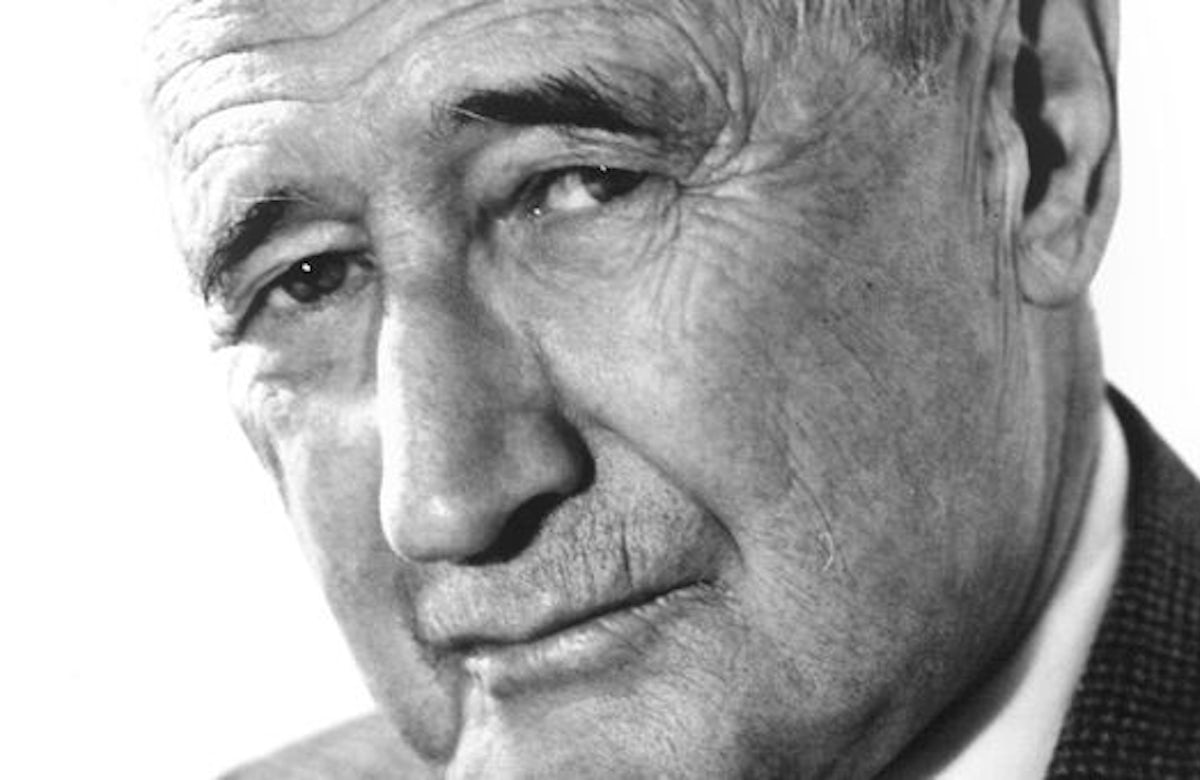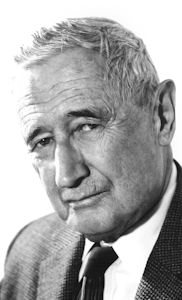 On 29 August 1982, Nahum Goldmann, the Zionist leader and co-founder and president of the World Jewish Congress from 1949 to 1977 died at the age of 87 in Bad Reichenhall, Germany.
On 29 August 1982, Nahum Goldmann, the Zionist leader and co-founder and president of the World Jewish Congress from 1949 to 1977 died at the age of 87 in Bad Reichenhall, Germany.
Nahum Goldmann was born in Vishnevo, then part of the Russian Empire that is now Belarus, in a shtetl in the Pale of Settlement as the son of a teaching and writing Litvak family. His father was an ardent Zionist. At the age of six, Nahum moved with his parents to Frankfurt, Germany, where his father entertained leading Zionists and intellectuals. In 1911, while still in high school, he and his father attended the Tenth Zionist Congress in Basle, Switzerland. Goldmann went on to study law, history, and philosophy in Marburg, Heidelberg and Berlin. He graduated in law and philosophy.
In 1913, he visited Palestine for four months, publishing his impressions the following year in his book, ‘Eretz Israel - Travel letters from Palestine’ which was published in German in two editions. In 1918, while working at the Jewish division of the German Foreign Ministry, he attempted to enlist Kaiser Wilhelm's support for the Zionist ideal.
In 1922, he founded the Eschkol Publication Society and was involved in publishing a Zionist periodical. In 1929, he and Jakob Klatzkin started the project ‘Encyclopaedia Judaica’, which reflected the work of the leading Jewish scholars of the day. Eschkol published ten volumes of the encyclopaedia in German and two volumes in Hebrew.
 In 1933, by a twist of fate, Goldmann managed to escape arrest by the Gestapo, because he was in Palestine for his father's funeral. In November 1934, Goldmann petitioned Italian dictator Benito Mussolini's support in relation to the Jews of the Saar, a region about to reunite with what was then Nazi Germany.
In 1933, by a twist of fate, Goldmann managed to escape arrest by the Gestapo, because he was in Palestine for his father's funeral. In November 1934, Goldmann petitioned Italian dictator Benito Mussolini's support in relation to the Jews of the Saar, a region about to reunite with what was then Nazi Germany.
After he was stripped of his German citizenship in 1935, Goldmann became a citizen of Honduras thanks to the intervention of the French Minister Louis Barthou. Later, he moved to the United States, settling in New York City, where he represented the Jewish Agency for several years.
During the 1930s, Goldmann and Rabbi Stephen S. Wise of the American Jewish Congress were the driving forces behind the creation of the World Jewish Congress, which was set up in Geneva, Switzerland in August 1936.
Goldmann is credited with the early prediction of the threat posed by Hitler and Nazi Party. In the spring of 1942, he said: "Who can foretell what the Nazi regime, once brought into the position of the surrounded killer, will do in the last moment before it goes down to shame?" Addressing the Zionist Organization of America in October 1942, having heard the reports of the mass murder of Jews in Europe, he lamented: "Our generation is in the tragic position that one-half of the generation is being slaughtered before our eyes, and the other half has to sit down and cannot prevent this catastrophe."
Goldmann called for an extraordinary Zionist conference in 1942 to form a cohesive strategy to attenuate the devastating effects of Nazi policies on European Jews, and the outcome was the Biltmore Program, which called for, among other things, unrestricted Jewish immigration to British Mandatory Palestine.
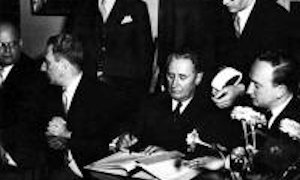 In January 1945, Goldmann was instrumental in the creation of a committee combining the efforts of the American Jewish Joint Distribution Committee (JDC) and the Jewish Agency for Israel for the rescue and rehabilitation of the remnants of the Jewish people in Europe.
In January 1945, Goldmann was instrumental in the creation of a committee combining the efforts of the American Jewish Joint Distribution Committee (JDC) and the Jewish Agency for Israel for the rescue and rehabilitation of the remnants of the Jewish people in Europe.
He was an ardent supporter of a two-state solution in Palestine, one Arab and one Jewish, and he later urged Israel to make peace with the Arabs. His view was that independence was more important than controlling a specific territory, and his definition was that the aim should be to create 'a viable Jewish state in an adequate area of Palestine’.
After the war, Goldmann worked actively with David Ben-Gurion towards the creation of Israel, although he advised in vain that the declaration of independence be delayed in order to allow more time for reaching a diplomatic understanding with the Arabs. He was concerned that an Arab-Israeli war would break out after the British left their Mandate and the State of Israel was proclaimed.
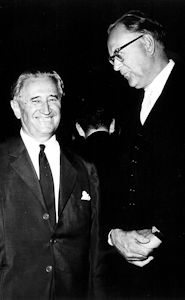 Following Wise’s death in 1949, Goldmann took over as president of the World Jewish Congress.
Following Wise’s death in 1949, Goldmann took over as president of the World Jewish Congress.
From 1951 he also was chairman of the Executive Committee of the Jewish Agency and the driving force behind the establishment of the Claims Conference, for which he negotiated an agreement with the West German government for reparation payments to Jews. In September 1952, after six months of negotiations, a settlement between the Claims Conference and the West German government led by Chancellor Konrad Adenauer was reached (picture above: Goldmann signing the treaty).
Noting the historic import of the agreement, Israel’s Prime Minister David Ben-Gurion said that “for the first time in the history of the Jewish people, oppressed and plundered for hundreds of years…the oppressor and plunderer has had to hand back some of the spoil and pay collective compensation for part of the material losses.” In 1954 a similar treaty was signed between Austria and Israel.
Goldmann supported Israel in other countries, even though he was critical of many Israeli policies. From 1956 to 1968, he also served as president of the World Zionist Organization, and he gave the impetus for the creation of the Conference of Presidents of Major American Jewish Organizations.
He became a citizen of Israel in 1962 and of Switzerland in 1969. He never took up permanent residence in Israel, dividing his time between Israel and Switzerland. During his life he held seven citizenships, and lived the last part of it in Paris, France.
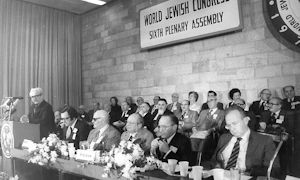 When Nahum Goldmann retired as WJC president in 1977 he was succeeded by Philip M. Klutznick. Goldmann died in Bad Reichenhall, Germany on 29 August 1982 at the age of 87 and was buried in Jerusalem's Mount Herzl National Cemetery. He was survived by his wife Alice and his two sons Guido and Michael. Until his death, Goldmann had remained active in Jewish affairs.
When Nahum Goldmann retired as WJC president in 1977 he was succeeded by Philip M. Klutznick. Goldmann died in Bad Reichenhall, Germany on 29 August 1982 at the age of 87 and was buried in Jerusalem's Mount Herzl National Cemetery. He was survived by his wife Alice and his two sons Guido and Michael. Until his death, Goldmann had remained active in Jewish affairs.
Picture captions from top to bottom: Portrait; Goldmann seated (left) with Rabbi Stephen S. Wise and French lawyer Henry Torrès (speaking) at the WJC Installation Conference in New York City in June 1942; signing the reparations agreement with West Germany in 1952; speaking to Swedish Prime Minister Tore Erlander during the WJC Plenary Assembly in Stockholm in 1959; addressing the Sixth WJC Plenary Assembly in Jerusalem in 1975, seated on the right: Israeli Prime Minister Yitzhak Rabin.

